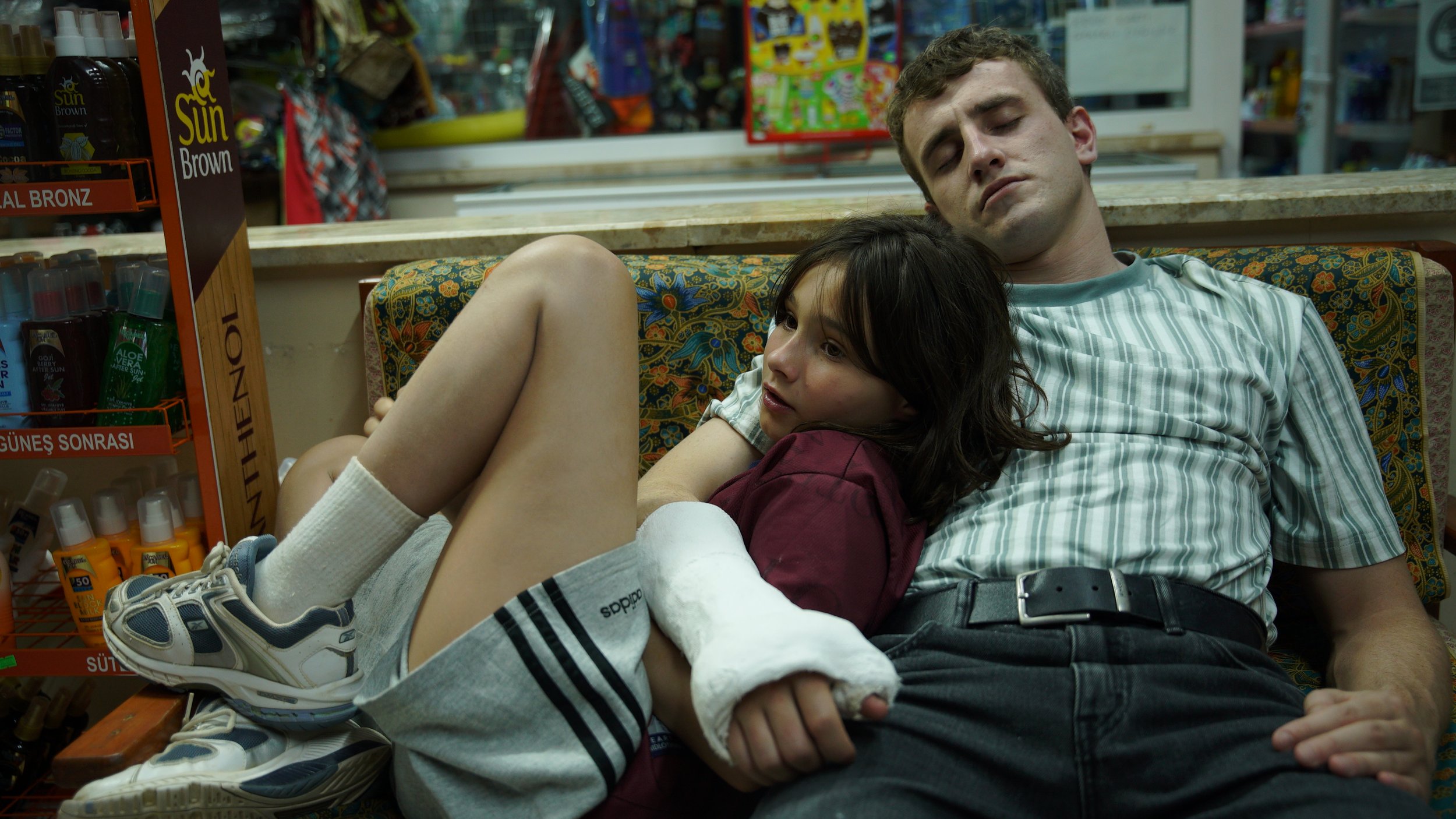Review: Aftersun (2022)
Like a sunburn or the afterburn in your eyes after staring at the sun, Charlotte Wells’ Aftersun offers a painful reminder of the past. The film is a cinematic memory seemingly ripped from the mind of Wells and transferred onto the screen, with little ornamentation or nostalgic veneer. The film is about that painful realization that comes with time, when the facts of your past clarify and you start to see the things that lingered just outside your frame of view when you were younger. Like James Gray’s Armageddon Time or Steven Spielberg’s The Fabelmans, it’s semi-autobiographical, lending it an intimacy that is impossible to fake. As far as cinematic debuts come, it’s brilliant.
The film charts an unremarkable Turkish holiday taken by Calum (Paul Mescal) and his 11-year-old daughter Sophie (Frankie Corio) in the late 90s. From the moment they arrive at the resort, everything seems rather mediocre. Late upon arrival, they have to wait too long to get their room and when they do get it, it’s the wrong one. Calum has to make do with a cot for the week and their view is sullied by ongoing construction. But the sun is nice and the waters are cool and Calum and Sophie make the most of it.
They go on excursions to ruins, they swim in the pool, they play arcade games, they watch the evening shows. Sophie records her father on a DV camcorder and they make a game of the documentation. Sophie shows budding artistic promise in her recordings. Calum, only 30 and forced into maturity as a young father, drinks a bit too much and Sophie pretends to be older than she is to cozy up to some teens at the resort, but there is no drama or forced confrontations. These are ordinary, well-meaning people on vacation and we go along on the vacation with them. For a moment, Aftersun seems to be another British domestic drama, typically mundane, typically dour, a bit sad, but unremarkable.
But this rather ordinary vision of a mediocre holiday isn’t presented in a vacuum. Rather, it is viewed as memory, framed by depictions of the present day. Interspersed throughout the narrative are glimpses of Sophie (Celia Rowlson-Hall) in the present day, the same age as her father at the time, watching vacation footage and remembering the past. We don’t get proper scenes in the present day. We get glimpses of Sophie’s adult life, but no exposition or explanation of what happened in the interim years or what happened to Calum. The present is hazy, witnessed like a dream or a distant memory, bobbing into view like an object floating on the waves of the ocean. The past, however, is clear. And that clarity brings pain. The framing device lends everything a melancholy foreboding: clearly, this mediocre vacation means the world to Sophie, but why?
The answer to that comes in how the holiday unlocks Sophie’s understanding of her father as a person, and not just as her dad. Of course, that realization only comes afterwards, but all the details are there in the scenes on holiday. Sophie, played with astounding naturalness by newcomer Frankie Corio, picks up on signals from her dad. She notices him ordering one too many pints. She spies his looks of dejection or his exasperated sighs, but she never puts two-and-two together. She never realizes that her dad is hurting until it’s too late to do anything about it. Mescal, for his part, walks a subtle line. It’d be easy to misplay a character like Calum who is the quintessential “sad dad,” but Mescal never overdoes it. His pain seems genuine, his affection for Sophie equally so. Calum is quietly struggling and Mescal lets us see that, but he never makes a show of his inward pain.
Don’t mistake this description as implying Aftersun works towards a dramatic climax where Calum implodes in spectacular fashion. We never get such a fabulous display of emotion. Perhaps the lack of such a moment clarifies why the film holds a melancholy power, but never breaks over into emotional catharsis. Sophie never gets catharsis. We can assume that Wells never did as well, or else she wouldn’t be making this film. So we’re left at a bit of a remove, watching someone else watch their own past, reconstruct the pain, process the understanding.
The experience is a bit distant, a bit subtle, but it’s clarifying and sad and a bit beautiful. We can never care for these people as much as Wells does, which means it’s always a film more for her, than for us, but such is the intimacy of art, especially art that looks so deliberately inward. The film is a tribute to a man who was understood only in retrospect. As Kierkegaard said, “Life can only be understood backwards, but it must be lived forwards.” The incongruity of this fact fuels Aftersun, igniting its slow-burning act of recollection and resurrection.
8 out of 10
Aftersun (2022, UK/USA)
Written and directed by Charlotte Wells; starring Paul Mescal, Frankie Corio.



Mayor of Mayhem is an embarrassingly lazy recounting of the Rob Ford saga.